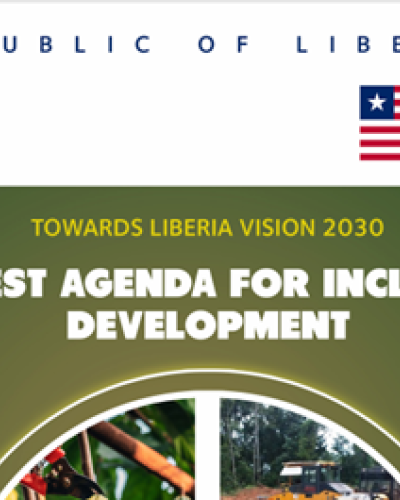ARREST Agenda for Inclusive Development 2025-2029

This ARREST Agenda for Inclusive Development (AAID) reflects Liberia’s commitment to achieving sustainable and inclusive growth from 2025-2029. As we chart a new course toward socio-economic transformation, we must acknowledge the challenges that have historically impeded our progress and focus on the opportunities available to us. Liberia remains a low-income country with significant governance, economic, and social constraints. Ranked 178th out of 191 countries in the 2024 Human Development Report, nearly 45 percent of the population lives in multidimensional poverty, a reality exacerbated by high unemployment, limited infrastructure, and insufficient access to basic services. Despite these challenges, Liberia is endowed with vast resources, (including natural and human),a young and dynamic population—over 41.5 percent of whom are under the age of 18.
Leveraging these assets requires robust leadership and a transformative approach, which are at the core of the AAID. The AAID is underpinned by principles of inclusiveness, sustainability, justice and equality, accountability, peace and reconciliation, and local ownership. It reflects the aspirations of all Liberians, shaped by nationwide consultations with stakeholders including government, civil society, private sector actors, traditional leaders, the youth, People with Disabilities, and international partners.
These consultations reinforced the ii importance of a people-centered development, addressing systemic barriers and structural inequalities while prioritizing the empowerment of marginalized communities. For the first time, we are adopting a development drivers and filters approach to foster sustainable socio economic development impact. We utilize the cause consequence approach to ensure that interventions are strategic and impactful, focusing on measurable cross-sectoral outcomes of development drivers and filters.
Additionally, the AAID is built on a program based approach to allow implementation of program based budgeting, hence strengthening the linkage between the development outcomes and the national budget. To attain the overarching goal of Liberia’s transition from a low-income country to a lower middle income country, the AAID was developed with macro assumptions to unlock its potential while remaining realistic.
This National Development Plan’s framework revolves around six strategic pillars: Economic Transformation Pillar emphasizes investment, job creation, export growth, and import substitution through industrialization. Key targets include increasing GDP per capita to US$1,050.3, achieving an average annual GDP growth rate of 5.9 percent, diversifying economic output, and enhancing food and nutrition security and resilience. Infrastructural Development Pillar prioritizes the construction and rehabilitation of transport and logistics infrastructure to reduce travel time, lower transportation costs, and foster connectivity. It also aims at the modernization and expansion of energy, housing, and ICT to improve effectiveness and effectiveness in the conduct of business, lower the cost of doing business, and enhance the attractiveness of the economic environment. Targets include paving a minimum of 485 km of primary roads and increasing access to affordable electricity both in rural and urban communities. Rule of Law Pillar centers on strengthening the legal frameworks to ensure a more transparent and effective justice system, that protects human rights, addresses greed and grievance and builds public trust, while National Development Plan 2025 – 2029 ARREST Agenda for Inclusive Development - AAID Governance and Anti-Corruption Pillar focuses on creating a functional state by enhancing governance systems and accountability at national and sub-national levels, fostering political stability and social cohesion. Environmental Sustainability Pillar promotes responsible natural resource management, biodiversity protection and enhancement of resilience to climate change. Finally, Human Capital Development Pillar focuses on investing in education, healthcare, sanitation, empowerment of women, youth, children, People with Disabilities (PWDs), and skills training to drive socio-economic progress. By enhancing youth and gender empowerment, we aim to capitalize on our demographic dividend and improve life expectancy, literacy, and workforce capabilities




















